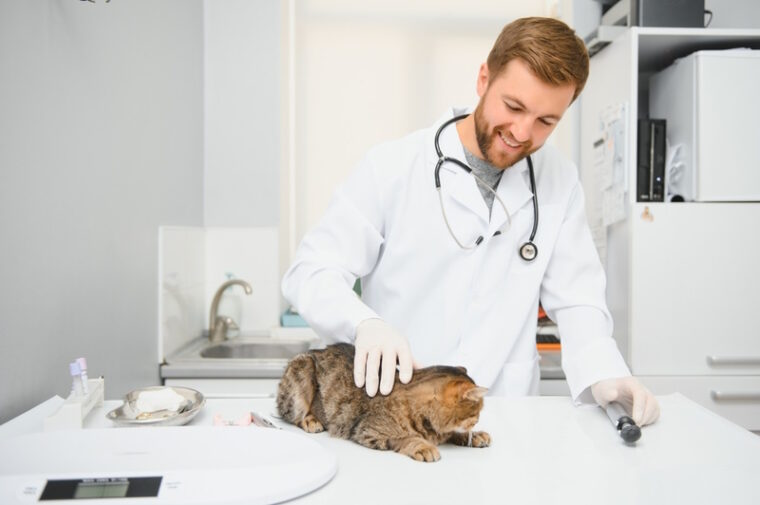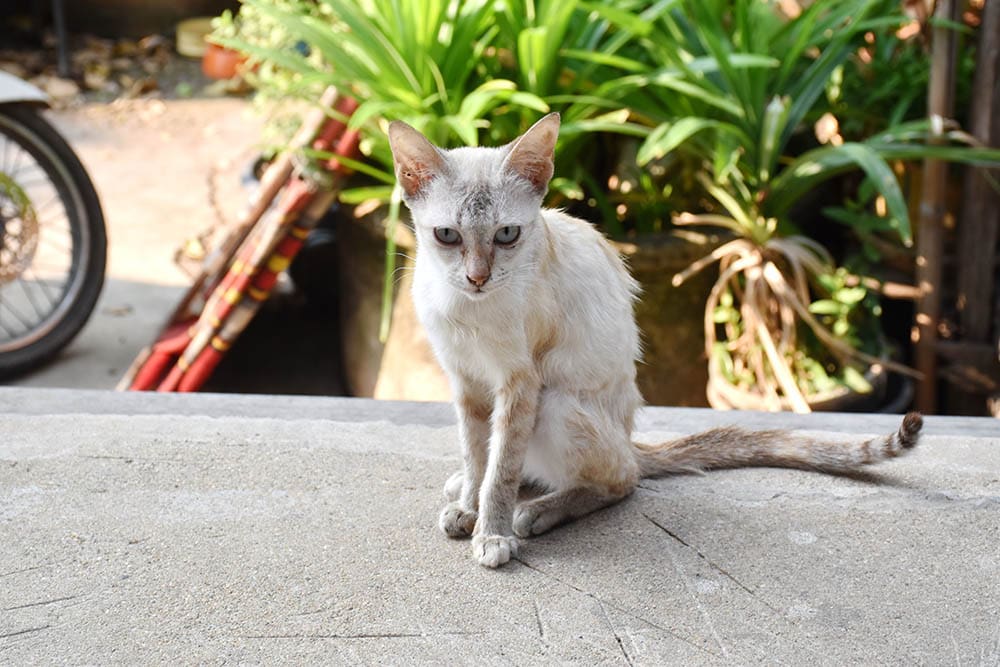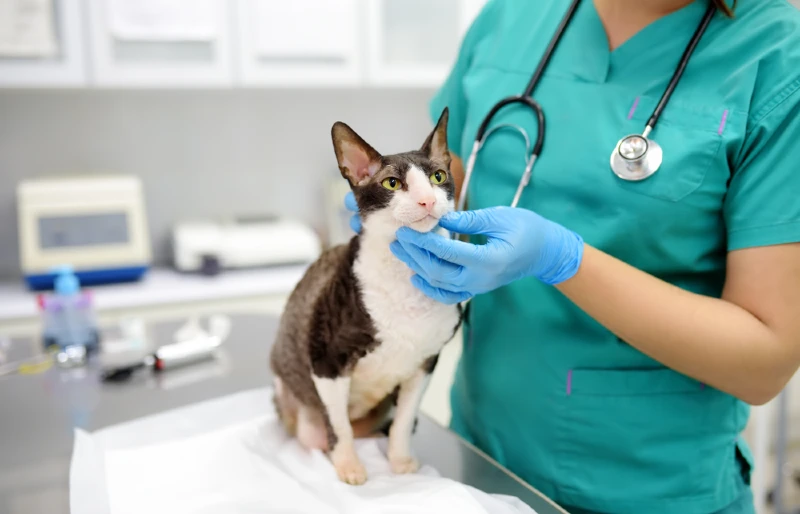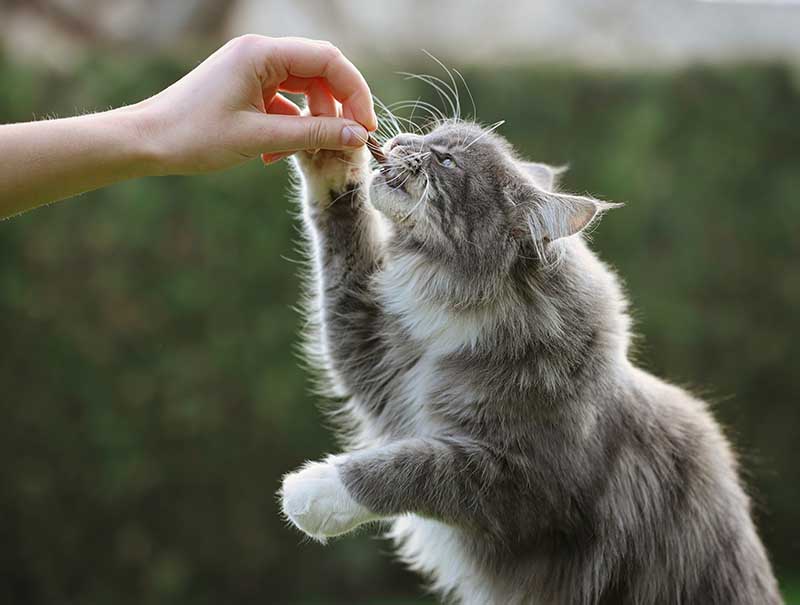
Click to Skip Ahead
Feline hyperthyroidism is a common endocrine disorder affecting cats in which too much thyroid hormone is produced. It is estimated that 10% of cats 10 years or older will develop hyperthyroidism1. Fortunately, there are many different treatment options available to treat hyperthyroidism including medication, surgery, iodine-restricted prescription diets, and radioactive iodine treatment.
Radioactive iodine treatment may sound scary, but it has quickly become one of the most recommended and safe forms of hyperthyroid treatment. Continue reading to learn more about this treatment option.
What Is Hyperthyroidism?
Hyperthyroidism is a common endocrine disorder in which one or both of the thyroid glands develop a tumor, which 98% of the time is benign in nature2. The thyroid tumor causes increased levels of thyroid hormone to be released. The thyroid hormone directly influences metabolism.
Cats suffering from hyperthyroidism can experience several different signs and secondary complications. Hyperthyroidism is a manageable disease, and treatment should be pursued for cats who have received the diagnosis. Historically, surgical removal of the affected thyroid gland had been done, although this presents more risk than other treatment options. Typically, treatment is through medication, iodine restricted diet, or radioactive iodine therapy.

Clinical Signs of Hyperthyroidism
Complications of Hyperthyroidism
When thyroid levels become too elevated, it directly influences blood pressure. Cats with hyperthyroidism can develop hypertension or high blood pressure. This can cause patients discomfort and is one reason it is thought that hyperthyroid cats are so vocal.
Prolonged hypertension can be problematic for the kidneys and eyes, and can place an increased strain on the heart. Hyperthyroidism can cause a variety of cardiac abnormalities including tachycardia, gallop rhythms, and wall thickening. These changes lead to an increased risk of heart failure. Fortunately, cats that receive treatment for hyperthyroidism can see an improvement in cardiac abnormalities and hypertension.

What Is Radioactive Iodine Therapy?
First, it is important to understand the role iodine plays in thyroid production. Iodine is required for the synthesis of thyroid hormones, and thyroid tumors produce this hormone at an increased rate, requiring more absorption of iodine. Normal functioning thyroid tissues stop absorbing as much iodine due to the recognized overabundance of thyroid hormones being produced by the abnormal cells.
Radioactive iodine treatment involves injecting a specific amount of radioactive iodine subcutaneously into the hyperthyroid patient. The radioactive iodine is then absorbed by overproducing thyroid tissue. The radioactive iodine will kill the over-productive thyroid tissue through the release of high-energy electrons. This leaves normal thyroid tissue minimally affected and will allow thyroid production to normalize over time.
This form of treatment has very low chances of adverse effects aside from abnormal thyroid tissue destruction, and, as a result, is a very safe treatment option. With just one injection of radioactive iodine, there is a 95% success rate.
When cats receive radioactive therapy, they must be hospitalized and minimally interacted with for 48–72 hours after their procedure due to radiation risk. As a result, it is imperative that the cat appears healthy enough to have minimal interactions in the days following the procedure.

Pre-Radioactive Iodine Treatment Work-Up
Prior to being admitted for radioactive iodine treatment, the provider will have a list of required prerequisites that must be done to determine if a patient is a good candidate for the procedure. The pretreatment workup can be performed by the referring vet, and results are sent to the specialist who will be overseeing treatment.
Radioactive iodine treatment is only performed at certain specialty practices and requirements may vary but typically include:
One optional but highly recommended test is called Pertechnetate Scan, which is offered by specialists performing the radioactive iodine treatment. This scan allows for all thyroid tissue to be visualized, including ectopic thyroid tissue. This visualization aids in the dose calculation of needed radioactive iodine based on tumor size, not the weight of the patient. Although not 100% diagnostic, this technique can also help identify rare cases of malignant thyroid tumors and metastasis.

How Do I Care for a Cat Who Received Radioactive Iodine Treatment?
After your cat has been cleared of having high levels of radiation, they will be released to you. Close monitoring of the patient will be recommended for a few days along with discharge instructions regarding handling and care. Once released, your cat will still have some low levels of radiation present, so interactions with your cat will still be limited.
The levels of radiation are low; however, the goal is to minimize the amount of radiation you are exposed to throughout your lifetime. As a result, the facility that performs treatment will have a list of post-treatment discharge instructions. It is recommended that pregnant individuals and children have no contact with the cat for 1–2 weeks following the procedure. Additionally, litter will need to be flushed or stored for the 2 weeks following treatment, and your pet will not be allowed to sleep with you.
Success of the treatment will be monitored through intermittent blood work screening that occurs 4 weeks and 3 months after the procedure. This will help identify any signs of renal disease that the hyperthyroid treatment has unveiled and will determine where your cat’s thyroid levels are following treatment.
Roughly 3–5% of patients treated with radioactive iodine treatment will develop hypothyroidism that requires lifelong thyroid supplementation. Alternatively, another very low percentage of patients may require an additional round of radioactive iodine treatment.

Frequently Asked Questions
Is Radioactive Iodine Treatment Dangerous to My Cat?
The risk of untreated hyperthyroidism is much higher than the risks associated with radioactive iodine treatment. Radioactive iodine itself is not associated with many adverse effects. Some patients may experience signs associated with thyroid level adjustments, and potentially hypersalivation immediately after the procedure.
What Are the Long-Term Risks Associated With Radioactive Iodine Treatment?
Very rarely, patients may develop hypothyroidism secondary to treatment and will require thyroid supplementation.
Will I Be Able to Visit My Cat During Hospitalization Following Treatment?
Unfortunately, no. Due to the higher levels of radiation during hospitalization, family visitation is not allowed.
In Summary
Radioactive iodine treatment is a safe and highly effective way of curing hyperthyroidism in cats, with a 95% success rate following just one treatment. Patients treated with radioactive iodine therapy are relieved of clinical signs associated with the disease and are not subject to daily administration of medication. Your veterinarian will help refer you to a specialty practice that offers this service and will run the necessary test to ensure that your patient is a good candidate for radioactive iodine treatment.
Featured Image Credit: Hryshchyshen Serhii, Shutterstock







